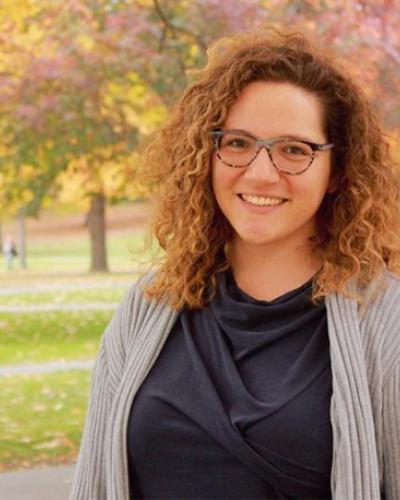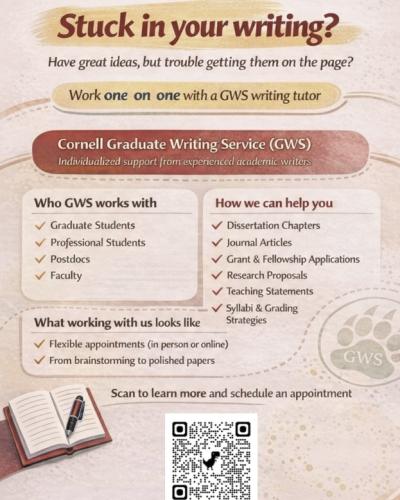Cornell Writes! Tips from our community of writers is a digital newsletter sponsored by the Knight Institute for Writing in the Disciplines and the Cornell University Graduate School.
Each week, a member of our writing community – a Graduate Writing Service, English Language Support Office, or Cornell Writing Centers tutor; a writing specialist from the Knight Institute; a writing instructor from our First-Year Writing Seminars or Writing in the Majors programs; maybe YOU – will share a writing strategy from their own writer’s toolkit. #writelikeabear
Contact Tracy Hamler Carrick with questions and ideas.
Meet Tamar Gutfeld
Hello Cornell writers! My name is Tamar Gutfeld. I am a PhD candidate in German Studies, a tutor, and the graduate assistant director of the Knight Institute’s Graduate Writing Service. This week, I am editing a dissertation chapter and beginning to draft another one.
Here is this week’s Writing Tip!
Last week I had a wonderful writing session at a local café. The music was great, there was just the right amount of chatter and the words seemed to flow out of the keyboard with no effort on my part. I don’t have enough words, in all my working languages, to describe the failure I endured this week in attempting to recreate this experience. Turns out, finding the right writing space amounts to more than identifying the physical space that fits the task at hand.
Tending to our physical space, it is easy to get carried away with conflicting advice: while some convey that an organized space is key to organized thoughts and clean prose, others will tell you with as much conviction that the opposite is true, that house chores must be ignored to give writing the time it requires. Such advice includes a lot of “shoulds”, it contains a promise that writing would be easier if only we could be a bit different. Whether the advice claims one thing or another, the message is the same: you need to change your habits to become the writer you want to be. What would happen if instead of forcing ourselves into a different mold, we get to know the writing space we already have?
Before changing anything, I take stock of what I have before rushing to change it. Arriving in my writing space is less about placing a succulent on my desk, but rather knowing that such a succulent will certainly be squished by heaps of books and clutter. And that it is ok. I need my pile of books like I need the 26 open tabs on my browser. Arriving at my writing place means to acknowledge what works for me instead of holding on to an ideal of what is supposed to work: maybe it is better for you to write first thing in the morning, maybe the best writing time for you is 3:27pm after you had your afternoon coffee. Not one approach is inherently better than the other - it is about what works for you, not what should have worked.
With curiosity, I explore my writing space: maybe I need a new metaphoric light bulb, maybe the figurative desk wobbles, but it is mine. Acknowledging what I have before rushing to change it allows me to slow down, to appreciate my own process, even to enjoy it.
However, there is a major problem with this magical writing space: it is treacherous and tricky. The directions for how to get there change daily and the upkeep is somewhat costly. What works one day may not work another. The same music that helped move the draft forward could be pure noise the very next day. You may know what generally works for you, and still there would be difficult times in front of the draft. Instead of resisting the resistance, try to listen to it. What does it tell you about your needs at the current moment? Daily changes remind us that our writing spaces are not a destination, that finding them is a process. They remind us that even when we think we have arrived, our writing spaces keep developing and changing.
Acknowledging change and welcoming process helps me to find the writing space I already have rather than the one I thought I ought to have already established.
No physical room could embody this state of mind.






